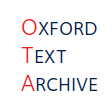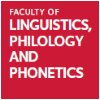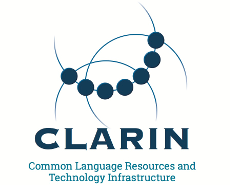EEBO - Early English Books Online
EEBO-TCP is a partnership between the Universities of Michigan and Oxford and the publisher ProQuest to create accurately transcribed and encoded texts based on the image sets published by ProQuest via their Early English Books Online (EEBO) database (http://eebo.chadwyck.com). The general aim of EEBO-TCP is to encode one copy (usually the first edition) of every monographic English-language title published between 1473 and 1700 available in EEBO.
EEBO-TCP aimed to produce large quantities of textual data within the usual project restraints of time and funding, and therefore chose to create diplomatic transcriptions (as opposed to critical editions) with light-touch, mainly structural encoding based on the Text Encoding Initiative (http://www.tei-c.org).
The EEBO-TCP project was divided into two phases. The 25,363 texts created during Phase 1 of the project have been released into the public domain as of 1 January 2015. The 28,462 texts of Phase 2 were released into the public domain in 2020. Anyone can now take and use these texts for their own purposes, but we respectfully request that due credit and attribution be given to their original source.
Users should be aware of the process of creating the TCP texts, and therefore of any assumptions that can be made about the data.
Text selection was based on the New Cambridge Bibliography of English Literature (NCBEL). If an author (or for an anonymous work, the title) appears in NCBEL, then their works are eligible for inclusion. Selection was intended to range over a wide variety of subject areas, to reflect the true nature of the print record of the period. In general, first editions of a works in English were prioritized, although there are a number of works in other languages, notably Latin and Welsh, included and sometimes a second or later edition of a work was chosen if there was a compelling reason to do so.
Image sets were sent to external keying companies for transcription and basic encoding. Quality assurance was then carried out by editorial teams in Oxford and Michigan. 5% (or 5 pages, whichever is the greater) of each text was proofread for accuracy and those which did not meet QA standards were returned to the keyers to be redone. After proofreading, the encoding was enhanced and/or corrected and characters marked as illegible were corrected where possible up to a limit of 100 instances per text. Any remaining illegibles were encoded as <gap>s. Understanding these processes should make clear that, while the overall quality of TCP data is very good, some errors will remain and some readable characters will be marked as illegible. Users should bear in mind that in all likelihood such instances will never have been looked at by a TCP editor.
The texts were encoded and linked to page images in accordance with level 4 of the TEI in Libraries guidelines. The persistence of the links and the availability of the page images provided by the publishers cannot be guaranteed and should be considered at risk.
Copies of the texts have been issued variously as SGML (TCP schema; ASCII text with mnemonic sdata character entities); displayable XML (TCP schema; characters represented either as UTF-8 Unicode or text strings within braces); or lossless XML (TEI P5, characters represented either as UTF-8 Unicode or TEI g elements).
The texts made available here are the TEI P5 XML files and other formats derived automatically from this version, in epub and HTML format. This work was carried out at IT Services, University of Oxford, by Sebastian Rahtz, James Cummings and Lou Burnard. A version of each file with linguistic annotation, as carried out by the SAMUELS project and UCREL, Lancaster University.
Keying and markup guidelines are available at the Text Creation Partnership web site.
News
Some time in 2024 JISC Historical Books service was closed down. Unfortunately, we weren't informed about this, and there are now broken links to the images of the books in this collection. We're looking into removing the broken links, or, ideally, replacing them with valid links. What were previously two collections - EEBO Phase 1 and EEBO Phase 2 - were merged into one collection in August 2022. The rationale for the original division into Phases was that there were different access restrictions on the two sub-collections. Now that all texts are in the public domain, there is no longer any good reason to separate them.
This keyboarded and encoded edition of the work described above is co-owned by the institutions providing financial support to the Early English Books Online Text Creation Partnership. This text is available for reuse, according to the terms of Creative Commons 0 1.0 Universal. The text can be copied, modified, distributed and performed, even for commercial purposes, all without asking permission.
Recent Submissions
-
TextEEBO-TCP
 Date of publication:
Date of publication:
1605Description:Signatures: A⁴(-A1) B⁴. Includes marginal notes. Imperfect: stained with print show-through and creased with loss of print. Reproduction of original in the Exeter College (University of Oxford). Library.This item contains 3 files (124.25 KB).Publicly Available -
-
TextEEBO-TCP
 Date of publication:
Date of publication:
1553Description:The Forty-two Articles of 1552. Another issue of STC 10034, partially reset. At foot of title page: Published by the kinges Maiesties commaundement, in the moneth of Maie. Anno Domini. 1553. Signatures: A-C⁴. Identified ...This item contains 3 files (121.42 KB).Publicly Available -
-
TextEEBO-TCP
 Date of publication:
Date of publication:
1615Description:Running title reads: A sermon preached for the clearing of iustification. Reproduction of the original in the Henry E. Huntington Library and Art Gallery.This item contains 3 files (499.72 KB).Publicly Available -
-
TextEEBO-TCP
 Date of publication:
Date of publication:
1640Description:Based on day 10, novel 10 of: Boccaccio, Giovanni. Decamerone. Printer's name from and publication date conjectured by STC. A1r has half title reading: The history of the noble Marques. In verse. Signatures: A B⁴. Imperfect: ...This item contains 3 files (105.29 KB).Publicly Available -
-
TextEEBO-TCP
 Date of publication:
Date of publication:
1627Description:Printer's name from STC. Cf. Folger catalogue, which gives signatures: A-F⁴. Running title reads: A godly womans praise. Reproduction of the original in the Henry E. Huntington Library and Art Gallery.This item contains 3 files (424.14 KB).Publicly Available -




